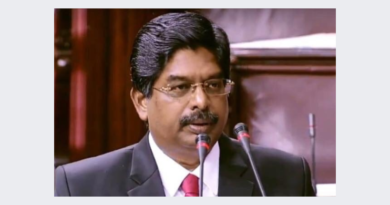India-UK Legal Ties Strengthen as High-Profile Arbitration Conference Wraps Up in London
(Judicial Quest News Network)
The third edition of the International Conference on Arbitrating Indo-UK Commercial Disputes concluded in London last week, drawing prominent figures from the legal communities of both nations.
Among the distinguished attendees were Chief Justice of India (CJI) BR Gavai India’s Minister of State for Law and Justice (Independent Charge) Arjun Ram Meghwal, UK Supreme Court Justice Lord Michael Briggs, and Indian Ambassador to the UK, Vikram Doraiswami.
Other notable participants included the President of the Indian Council of Arbitration (ICA) and senior partner at Khaitan & Co., Dr.NG Khaitan ICA Director General Arun Chawla, and London-based barrister and ICA International Advisory Committee member Karishma Vohra of 39 Essex Chambers.
In his address, CJI BR Gavai emphasized the shared legal heritage between India and the UK, stating that this historic synergy offers a unique platform to develop strong, efficient, and internationally recognized arbitration frameworks in both countries.
The conference served as a forum for advancing cross-border cooperation in commercial dispute resolution and underlined the growing importance of arbitration as a preferred method for settling international business conflicts.
In his address, it was emphasized that India has much to learn from the United Kingdom’s well-established arbitration ecosystem, which hosts some of the world’s foremost arbitral institutions—most notably, the London Court of International Arbitration (LCIA). These institutions are renowned for providing access to highly distinguished arbitrators and for their efficient, flexible, and impartial administration of arbitration and other alternative dispute resolution (ADR) mechanisms, the Chief Justice of India (CJI) remarked.
He noted that the United Kingdom’s reputation as a global hub for commercial arbitration, combined with India’s rapidly expanding economy and ongoing legal reforms, presents a unique opportunity for deep and mutually beneficial cooperation in the field of dispute resolution. By fostering meaningful dialogue, encouraging joint institutional initiatives, and building confidence among legal practitioners and business communities, India and the UK can together cultivate a seamless, robust dispute resolution environment that will benefit both nations.
Comparing Legal Frameworks: A Shared Foundation with Key Differences
Lord Briggs highlighted both the commonalities and distinctions between the statutory arbitration regimes of the two countries. While both India and the UK have laws rooted in the UNCITRAL Model Law—the Indian Arbitration and Conciliation Act, 1996 and the English Arbitration Act—they diverge significantly in certain respects.
One of the key differences lies in the appeal process. The Indian statute does not offer an equivalent to Section 69 of the English Arbitration Act, which allows—subject to party agreement and stringent conditions—an appeal to the courts on a point of law. In England, such appeals are only permitted with the court’s leave, and the commercial courts apply this provision rigorously.
Conversely, the English Act has no direct counterpart to Section 34 of India’s Arbitration Act. Section 34 permits Indian courts to set aside an arbitral award if it is found to be in conflict with the public policy of India. Despite these legal distinctions, Lord Briggs underscored that both jurisdictions are deeply embedded in the tradition of the common law, which has historically recognized and upheld the right to a fair hearing.
Transparency vs. Confidentiality in Arbitration
Lord Briggs also expressed concern over the increasing reliance on confidential arbitration, especially in cross-border commercial disputes. He warned that if this trend continues unchecked, it might erode the richness of common law jurisprudence. Legal precedents, typically developed through public judgments in open court, could diminish if key decisions remain hidden behind closed doors in private arbitration settings. To counter this, he proposed a practice of publishing arbitral awards in appropriately anonymized and redacted formats to preserve legal transparency.
FTA and Legal Reform: A Strategic Convergence
Indian High Commissioner to the UK, Mr. Vikram Doraiswami, described the recently signed Free Trade Agreement (FTA) between India and the UK as the most ambitious bilateral trade accord to date. He noted that it has opened up new avenues in the services sectors of both nations. “Frankly, where there is more business, there will inevitably be more disputes,” he said. “And if we accept that a fair dispute resolution process is what distinguishes democracies from authoritarian regimes, then strengthening this mechanism will ultimately benefit all parties involved.”
Doraiswami also highlighted the significant strides India has made in transforming and modernizing its legal system over the last decade. He called this moment an unprecedented opportunity, as India remains the only major democracy where millions are being lifted out of poverty through economic growth and democratic governance.
Legal Collaboration in Action
Flora Vora emphasized that trade continues to connect the UK and India, and that mutual respect between their legal systems runs deep. She referenced the well-known Malhotra v. Malhotra case, where a judgment from the English High Court—delivered by Justice Warby—was cited and adopted by Justice Patel of the Bombay High Court in a parallel decision. “Wearing two hats, as a barrister of England and Wales and as counsel at the Bombay High Court, I’ve personally benefited from and remain grateful for the legal camaraderie and cross-jurisdictional respect shared between our nations,” she said.
Vora further acknowledged the leadership of Chief Justice D.Y. Chandrachud and Lord Briggs in advancing commercial dispute resolution. She noted that Indian legal reforms have seen renewed momentum in recent weeks, paving the way for more efficient dispute resolution mechanisms.
Building a Transparent and Fair Framework
Meanwhile, Justice Meghwal noted that India and the UK are currently experiencing one of the strongest phases in their bilateral relationship. He described the signing of the FTA as a historic milestone and emphasized the potential for both nations to jointly establish high standards in dispute resolution. By working together, he suggested, India and the UK can craft a framework that is not only fair and transparent but also one that instills strong business confidence on both sides.




